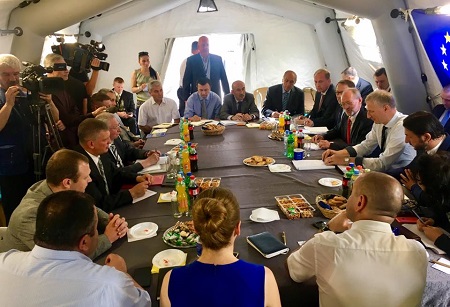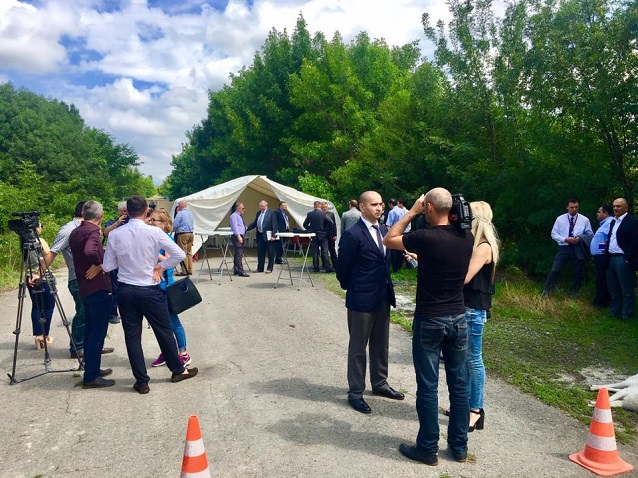Hard discussion in Ergneti: Creeping occupation high on agenda

Georgian officials, representatives of international organisations and de-facto authorities from Georgia’s Russian-occupied regions have been sitting around the table for six hours in what they called "one of the most difficult talks” in Ergneti today.
A tent in the village of Ergneti near the occupation line in central Georgia hosted the 79-th Incident Prevention and Response Mechanism (IPRM) meeting. What made today’s talks extraordinarily hard is that a number of incidents have accumulated during the recent month that the sides know would be difficult to negotiate on.
One of the most acute issues the Georgian side raised at the meeting was the creeping occupation and the latest case of moving the occupation line further into Georgian territory last week.
This incident saw several agricultural lands in the Georgian village of Bershieti fall behind the occupation line; now the farmers cannot reach their fields and this is when they were just about to harvest.

Preparations for the IPRM meeting. Photo: European Union Monitoring Mission in Georgia / Facebook.
The IPRM meeting was facilitated by Kestutis Jankauskas, the Head of the European Union Monitoring Mission in Georgia (EUMM) and Ambassador Guenther Baechler, the Special Representative of the OSCE Chairperson-in-Office for the South Caucasus.
Outside the tent, just before the meeting started, Georgian media filmed representative of the breakaway Tskhinvali region Murad Joiev talking to Ambassador Baechler about the demarcation of the so-called border and the possibility of banning local farmers from approaching the "border” closer than 200 metres. Joiev was heard saying:
"They should not do agricultural activities here. I understand that even 200 and 100 metres are decisive for local residents. It’s difficult, but why shouldn't we try to explain to locals that they should not approach and cross the line? And for the line not to be crossed it is necessary that these lines are marked.”
Later on Joiev said that journalists misunderstood the conversation and added that he would make further comments only after the meeting. The meeting ended a short ago and Joiev repeated again that no 200m distance term "or anything like this" will be introduced.
Representative of the central Georgian Government Kakhaber Kemoklidze said that the de-facto leaders of occupied Tskhinvali think that the only solution to the problem is the demarcation of the "border”.
"This is a trap against the central government and there is no way we are going to be trapped in it”, Kemoklidze said.
The IPRM was created in February 2009 as a result of the Geneva Discussions that followed the 2008 Russia-Georgia conflict in Georgia. The meetings are an opportunity to identify and discuss potential risks and follow-up of incidents and issues affecting the communities in the occupied area on a daily basis.
 Tweet
Tweet  Share
Share